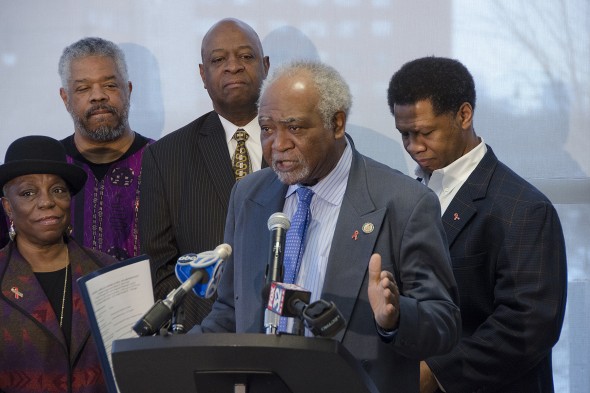Community health centers at forefront of HIV/AIDS fight

“We can make a difference,” Rep. Danny Davis says at an event marking National African American HIV Awareness Day at Mile Square Health Center. Photo: Joshua Clark/UIC Photo Services
Community health centers like Mile Square are on the forefront of the fight against HIV/AIDS in the 21st century, said health and political leaders at an event to mark National African American HIV Awareness Day Feb. 6.
“We’ve come a long way in understanding how healthy someone living with HIV can be,” said Rep. Danny Davis. “We can make a difference!”
Mile Square director Henry Taylor noted this is the 50th anniversary year for community health centers and praised Davis as an early supporter who introduced the first legislation creating the centers.
“We treat the most vulnerable population, with 50 percent of our patients below the poverty level with 25 percent the poorest of the poor,” Taylor said.
Robert Wynn, executive director and CEO of the Mile Square Health Center, spoke of the need to move to a model for combating HIV/AIDS that relies on a real community-university-medical center partnership.
“We have the opportunity to do something better,” Wynn said. “We have to determine how to get the best care that we have to everyone.”
The speakers hoped to use National African American HIV Awareness Day to tell the story of HIV/AIDS in the African American community:
- In Illinois, African Americans make up 44 percent of the population with HIV/AIDS — 41 percent nationally.
- African Americans make up only 12 percent of the Illinois population, but 44 percent of new diagnoses.
- People aged 19-24 are the fastest growing population with new diagnoses of HIV/AIDS.
- $1.5 million in funds designated by the Illinois legislature to respond to AIDS in the African American community has never been released to the organizations fighting HIV/AIDS. Many of these organizations were struggling to continue their work, and even to just keep their doors open.
- Screening for HIV needs to become a routine part of quality care.
- 20 percent of people who are HIV positive don’t know it.
Mildred Williamson, the Midwest regional member of the Presidential Advisory Group on HIV/AIDS, summed up the message of the conference: HIV infection is 100 percent preventable, 100 percent treatable and progression to AIDS is 100 percent preventable.
“Black lives matter,” said Williamson. “They must, in order to get to an AIDS-free future for everyone.”
